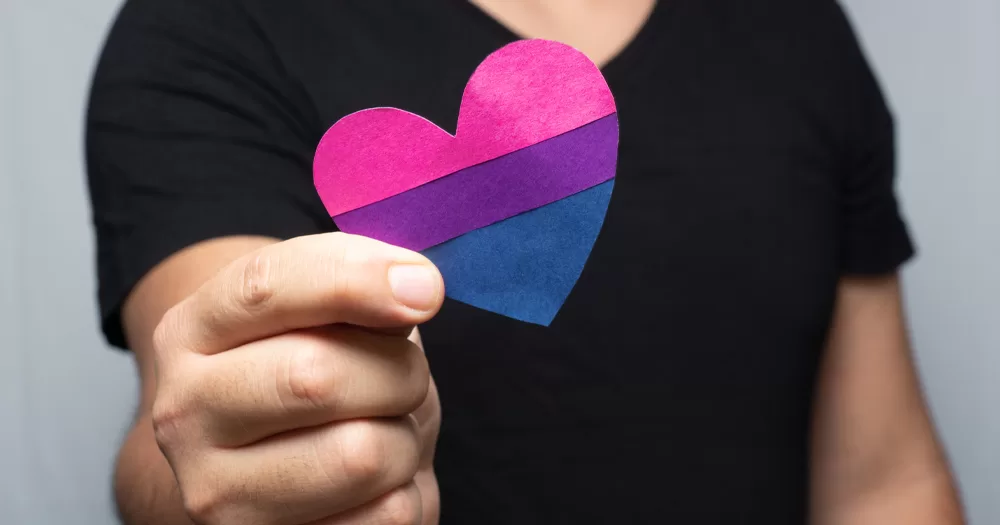While being an ally is a full-time commitment, this Bisexual Awareness Week, let’s look at some of the ways in which we can be a good ally to everyone in the bi+ community.
When it comes to challenging misconceptions, creating supportive environments, and knowing when to intervene, here are five ways to create safe and inclusive communities and make life easier for the bi+ people in your life.
Educate yourself
One of the most important ways to practice allyship is to stay curious, not get complacent, and continue to learn about the challenges and issues the bi+ community faces.
Compared to lesbian and gay people, bi+ people are more likely to face mental health challenges, bullying, and stigmas. Bisexual people also face a “double closet” when people assume their sexuality. Rory Gory, digital marketing manager of the Trevor Project, says: “Since bisexuals often move between straight and queer spaces, they are subjected to both homophobia and biphobia.”
Additionally, BIPOC bi+ people are vastly underrepresented, bi+ men face stigma within gay communities, bi+ women are often over-sexualised, ace bi people are told they can not actually be bi, and trans bi people are often questioned how their gender identity impacts their sexuality.
It’s important to learn to discern the misconceptions around bisexuality so you don’t have to ask your bi+ friends to do the emotional labour of teaching you.
Use correct, inclusive language
Bisexual advocate Robyn Ochs’ defines bisexuality as “The potential to be attracted – romantically and/or sexually – to people of more than one sex and/or gender, not necessarily at the same time, not necessarily in the same way, and not necessarily to the same degree.”
Identities within the bi+ umbrella may include bi, pan, queer, and others. Know how bi+ individuals identify and use the right labels to describe their identities. Be careful not to default to words like ‘gay’ as a catch-all for all LGBTQ+ identities, and be prepared to explain to others why it’s important.
Challenge myths about bisexuality
Bi-erasure occurs anytime someone questions whether bisexuality is real or suggests that bi people should “choose a side”. These statements are invalidating and the fear of judgement can make bi+ people less comfortable sharing their experiences.
Being a better bisexual ally includes challenging these misconceptions and identifying examples of biphobia and bi-erasure when they arise.
To stop discrimination from escalating, allies should practice speaking up whenever someone perpetuates harmful stereotypes. This can be as simple as saying something like, “Actually, that’s not true, my friend who is bisexual does not fit that stereotype.”
This Bisexual Awareness Week, we’re centering our bi+ community of bisexual, pansexual, queer, omnisexual, fluid friends, and everyone in between ??? pic.twitter.com/kWJU0xvpzr
— The Trevor Project (@TrevorProject) September 16, 2023
Recognise your own role in biphobia
Mackenzie Hart, coordinator of GLAAD’s Media Institute, an organisation that strives to accurately portray LGBTQ+ identities in media, television, and film, said: “Sometimes we don’t even know we’ve absorbed negative stereotypes if we’re not informed.”
Try to notice and question your own misconceptions and assumptions about someone’s bi identity, and challenge yourself not to assume someone’s sexuality based on the person they are dating.
Be affirming whenever someone comes out as bi
Whenever someone shares their bisexual identity with you, whether it’s a friend, family member, or work colleague, be affirming, encouraging, and validating.
Bi people are unfairly challenged and scrutinised for their identity, so when someone comes out, listen and take their lead on the language they use to describe themselves and their relationships.
Remind yourself that someone’s experience and bi+ identity may be different than what you assume, and don’t dispute their lived experiences.
These are just some of the ways to practice being a good bisexual ally. Check in with the bi+ people in your life and ask how you can be more supportive. When bi+ stereotypes arise in LGBTQ+ spaces, do not expect bi+ people to do all the work. Support other allies whenever they challenge prejudices as well.
© 2023 GCN (Gay Community News). All rights reserved.
Support GCN
GCN is a free, vital resource for Ireland’s LGBTQ+ community since 1988.
GCN is a trading name of National LGBT Federation CLG, a registered charity - Charity Number: 20034580.
GCN relies on the generous support of the community and allies to sustain the crucial work that we do. Producing GCN is costly, and, in an industry which has been hugely impacted by rising costs, we need your support to help sustain and grow this vital resource.
Supporting GCN for as little as €1.99 per month will help us continue our work as Ireland’s free, independent LGBTQ+ media.
